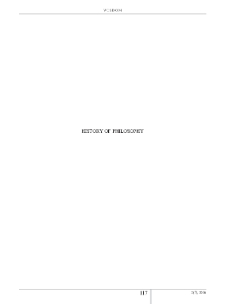Object
Title: From Ancient Greek Logos to European Rationality
Journal or Publication Title:
Date of publication:
Volume:
Number:
ISSN:
Corporate Creators:
Խ․ Աբովյանի անվան հայկական պետական մանկավարժական համալսարան
Coverage:
Abstract:
Because of history, culture, and politics, European identity has its archetypical elements in ancient Greek culture. Ancient Greek philosophy broughtLogos to fore and defined it as the crucial problem and the postulate of the human. We translate the Greek term Logosin English as reason or rationality. These terms, however, do not cover the semantic field of Logossince this includes, among other things, order of being, ground, language, argument etc. The juxtaposition of Logos (reason) to myth makes up the matrix of rationalism. Ancient Greek culture, however, was a culture of Logos (reason) as well as of myth and had enough room for forms, gods, and heroes, for science, poetry, and religious festivities. While ancient Greek culture seems to follow the logic of forms, modern European culture follows the logic of things.
Place of publishing:
Երևան
Publisher:
Format:
Identifier:
oai:arar.sci.am:370199
Language:
Object collections:
Last modified:
Oct 8, 2025
In our library since:
Feb 16, 2024
Number of object content hits:
97
All available object's versions:
https://arar.sci.am/publication/400005
Show description in RDF format:
Show description in OAI-PMH format:
-
Իմաստություն=Wisdom=Мудрость
-
Իմաստություն, 2013, N 1
-
Իմաստություն, 2014, N 1 (2)
-
Իմաստություն, 2014, N 2 (3)
-
Իմաստություն, 2015, N 1 (4)
-
Wisdom, 2015, N 2 (5)
-
Wisdom, 2016, N 1 (6)
-
Wisdom, 2016, N 2 (7)
- Editorial board
- Content
- Editor`s Foreword
- The Three-Tier Corrective Reasoning
- Compliment to a Compliment: An Analysis of the Speech Act of a Compliment
- On Moral Aspect of Sustainable Development Theory and Practice
- Tolerance as a Constructive Mechanism of Dialogue in the Field of Healthcare
- Paradoxes of Human Cognition
- Philosophical Wisdom as a Method of Formation of Worldview of an Individual
- The Methodological Importance of the Notion of Divine Revelation in a Historical Perspective
- Normative Contradictions in International Law: Implications for Legal Philosophy
- Idea and Models of Civil Society: Development Tendencies, Arguments Pro and Con
- The Alliance Between Politics and Philosophy with Regard to the Threats of the XXI Century
- On Two Factors of National Identity: Orientation and Social Structure of Society
- From Ancient Greek Logos to European Rationality
- Georg Brutian and NAS RA Institute of Arts
- The Main Theses of the Armenian Translation of the Definitions by Hermes Trismegistus
- The Eclipse and Rebirth of American Philosophical Pluralism: a History Lesson about History
- David the Invincible: Philosophy as a Lifestyle
- Changing Stereotypes With Regard to Special Needs Through Children’s Literature
- Psychological-Pedagogical Criteria for New Generation Textbooks
- The Methodical Principles of Child's Speech Development Curriculum
- The Essential Features of Electoral Process of Armenia in the Context of Current Changes in the Electoral Code
- The Concept of Time in the Works of Modernists
- Mechanisms of Overcoming Ethical Dilemmas in Nowadays Social Work
- The Role and Meaning of the Free Time in Context of Formation of Socio-Cultural Values in Modern Armenian Society
- Methodological Analysis of Political Participation Indicator Evaluation Tools
- Cultural Characteristic of Early Christianity
- Civil Society as an Area of a Personality Self-Realization
- Notes to Contributors
- Authors
-
Wisdom, 2017, N 1 (8)
-
Wisdom, 2017, N 2 (9)
-
Wisdom, 2018, N 1 (10)
-
Wisdom, 2018, N 2 (11)
-
Wisdom, 2019, N 1 (12)
-
Wisdom, 2019, N 2 (13)
-
Wisdom, 2020, N 1 (14)
-
Wisdom, 2020, N 2 (15)
-
Wisdom, 2020, N 3 (16)
-
Wisdom, 2021, N 1 (17)
-
Wisdom, 2021, N 1 (1) Special issue
-
Wisdom, 2021, N 2 (18)
-
Wisdom, 2021, N 3 (19)
-
Wisdom, 2021, N 4 (20)
-
Wisdom, 2022, N 1 (21)
-
Wisdom, 2022, N 1 (2) Special issue
-
Wisdom, 2022, N 2 (22)
-
Wisdom, 2022, N 2 (3) Special issue
-
Wisdom, 2022, N 3 (23)
-
Wisdom, 2022, N 3 (4) Special issue
-
Wisdom, 2022, N 4 (24)
-
Wisdom, 2023, N 1 (25)
-
Wisdom, 2023, N 2 (26)
-
Wisdom, 2023, N 3 (27)
-
Wisdom, 2023, N 4 (28)
-
Wisdom, 2024, N 1 (29)
-
Wisdom, 2024, N 2 (30)
-
Իմաստություն, 2013, N 1
| Edition name | Date |
|---|---|
| Apostolopoulou, Georgia, From Ancient Greek Logos to European Rationality | Oct 8, 2025 |





